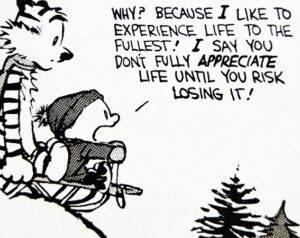Live a life of empty pleasure leading to loneliness … or a life of meaning and fulfilment
At times in our lives, we get tired of the struggle to “make it”. Whatever we dream to become, or achieve, rarely comes easily, so, it’s easy to get tired.
Most of us probably complain to God, or about God, and ask “Why is it so hard?”
Perhaps, more than most, Africans can complain about the lack of opportunities, or the cost of education, etc. And, yet, Africa is also full of courageous people who persevere and take risks.
I’ve noted in more wealthy societies over the last 40 years that, the easier it is to get money from the Government, the more struggle young people have to be happy and content.
I’m sure it’s complicated, but perhaps the move from agricultural to urban living is a factor: in agricultural areas, children learn (are expected) to do small jobs building up to bigger jobs. The children pick up many practical skills that help them cope with life challenges, and discover that the family needs to work together in order to be successful: helping each other.
In other words, life is not just about me, but us working together: we need each other. Also, I’m sure we’ve all noticed the change in conversations over the last 30 years: Now, most young people start conversations like: “Me and Dave ….”
In previous generations it was ALWAYS: “Dave and I …” or we received punishment!
So, many people suffer today because they have been conditioned by society to think of themselves first and others second; and often a distant second!
Psychologically speaking, when preoccupied with ourselves, it’s very difficult to find a satisfying meaning in life. Today’s readings help us with some concrete suggestions on how to move the focus away from ourselves, and discover a more fulfilling life: The call of Samuel teaches us to listen and be curious about the “calls” we hear in our lives. It also teaches us to check those “calls” with a trusted elder.

However, the “calls” we often hear are simply desires for pleasure, not meaningful activities. So, we need time to stop & listen – to reflect & discuss with others: are the calls persistent?
In the second reading, St Paul challenges us to avoid sexual activity outside of marriage (that’s what fornication refers to). The key here is not to demonise sexual activity but to recognise its power, in an uncontrolled environment, to lead us into a kind of slavery.
Deep within us, the key emotional need is love (not sex). Especially for young people, the pleasure from sexual activity can easily be confused with love. Unlike true love, however, sexual activities quickly become addictive and less rewarding as time goes on.
Yes, the pleasure continues, but the emptiness in our lives comes back more quickly. When we have meaning and true love in our lives, the desperate desire for sexual activity reduces.
So, how do we get meaning and true love in our lives? First of all, we need to stop listening to the world around us for some time. Hence, the importance of “retreats”, or “time out” or the “Sabbath day” or “family holidays.” A day free of phones and laptops?
Second, we need to look for direction in life and connect with people who challenge us,
not people who always agree with us. There are prophets in our world: we need to take time to search; to read; and listen to much more than the evening news.
The important thing is not being certain about what to do but, after reflection and asking for advice, we need courage to take a step and see what happens: God waits for our first step!
The two disciples of John (incl. Andrew), have the courage to ask Jesus “where do you live”. Jesus then invites them to join him. They went together. That’s a key point for us today: Try to link up with like-minded people and try something together. But what are we going to try? What type of activity will lead to deep meaning, rather than more selfish pleasure?
Today’s Responsorial Psalm says: “he heard my cry. He put a new song into my mouth,.” This might mean, today, that we should complain less, and do more to speak up for the truth.
It’s important to look for prophets who point us away from themselves. Prophets who promote themselves, simple create a life of slavery for those who follow. If other people we trust are willing to join us, it’s a good sign we might be doing the right thing: eg. Peter joins Andrew.
Today’s Gospel finishes with Jesus giving Peter a mission. What is your Mission in life?
If your Mission is only to get rich or be comfortable, you will not be happy.
If, however, our Mission is to empower other people, we are likely to become rich and happy.
Basically, unless we’re prepared to give our lives “away”, we will rarely receive our life back at a higher and happier level: we need courage to let go of ourselves, bit by bit, and allow God to return our lives back to us in a more powerful way: a life of meaning and service to others.
By Gerard Conlan, OMI


